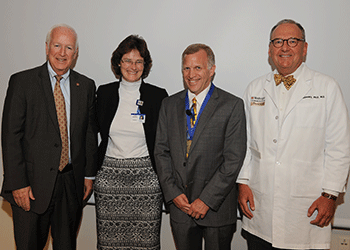
Stuart C. Sweet, MD, PhD, a world leader in pediatric lung transplantation, has been named the W. McKim Marriott, MD, Professor of Pediatrics at Washington University School of Medicine in St. Louis.
The professorship is supported by a dedicated endowment established by the St. Louis Children’s Hospital Foundation in partnership with St. Louis Children’s Hospital and the School of Medicine. It honors W. McKim Marriott, MD, who was a noted professor and chairman of pediatrics at the School of Medicine before serving as the school’s dean from 1923-36.
Professor Emeritus James P. Keating, MD, was the inaugural W. McKim Marriott, MD, Professor of Pediatrics. Keating retired in 2012.
“I am honored to hold this professorship, which reminds us of the important contributions Drs. Marriott and Keating made to Washington University and St. Louis Children’s Hospital,” Sweet said. “And I am grateful for the support provided by the St. Louis Children’s Hospital Foundation, which will help me continue our important work in pediatric transplantation.”
Alan L. Schwartz, PhD, MD, the Harriet B. Spoehrer Professor of Pediatrics and chair of the Department of Pediatrics, lauded Sweet for his leadership in the field.
“Stuart Sweet is perhaps the world’s leader in pediatric lung transplant,” Schwartz said. “He is a superior clinician, teacher and clinical investigator. Equally important is his commitment to improve the lives of all children via his regional, national and international advocacy.”
Sweet received his MD and PhD at the University of Michigan and was a pediatric resident at St. Louis Children’s Hospital and a pulmonary fellow at the School of Medicine before joining the faculty in 1996.
In 1999, he became medical director of the Pediatric Lung Transplant Program, a role in which he coordinates multidisciplinary care for children referred for lung transplant due to advanced lung or pulmonary vascular disease.
Sweet’s research has been focused on understanding the clinical biology of pediatric lung transplant and the way some respiratory viruses can lead to graft dysfunction in patients who receive transplants.
He is the principal investigator of the only National Institutes of Health-funded research program in pediatric lung transplantation. This multicenter, collaborative group initially was funded to study the role that viral infections play in lung transplant outcomes. The group recently received funding to pursue a second project to evaluate B-cell targeted induction in pediatric lung transplant recipients.
Recognized internationally for his expertise in pediatric lung transplantation, Sweet is a board member of the Organ Procurement and Transplantation Network (OPTN) and the United Network for Organ Sharing (UNOS) as well as the International Society for Heart and Lung Transplantation.
He also has served as chair of the OPTN/UNOS Pediatric Transplantation and Policy Oversight committees and chair of the OPTN/UNOS Lung Subcommittee. Further, he recently completed a term as president of the Missouri chapter of the American Academy of Pediatrics (AAP).
Sweet, an outstanding clinician and teacher, has published more than 90 peer-reviewed manuscripts, book chapters and reviews. He is associate editor of the American Journal of Transplantation and is on the editorial board of The Journal of Heart and Lung Transplantation.
W. McKim Marriott, MD
After receiving his medical degree, W. McKim Marriott became an instructor in biochemistry at Washington University in 1910. He left for a post at Johns Hopkins Medical School but returned to Washington University as a professor of pediatrics, becoming chairman of the department in 1917.
In 1923, Marriott was named dean of the School of Medicine, a position he held until 1936. He was known as a deeply talented and enthusiastic researcher whose clarity of thought helped make him an ideal teacher.
Washington University School of Medicine’s 2,100 employed and volunteer faculty physicians also are the medical staff of Barnes-Jewish and St. Louis Children’s hospitals. The School of Medicine is one of the leading medical research, teaching and patient-care institutions in the nation, currently ranked sixth in the nation by U.S. News & World Report. Through its affiliations with Barnes-Jewish and St. Louis Children’s hospitals, the School of Medicine is linked to BJC HealthCare.